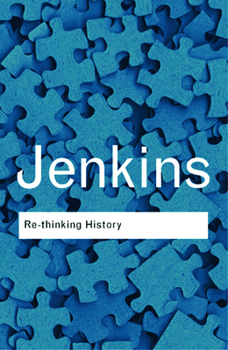Rethinking History
Select Format
Select Condition 
Book Overview
History means many things to many people. But finding an answer to the question 'What is history?' is a task few feel equipped to answer. If you want to explore this tantalising subject, where do you start? What are the critical skills you need to begin to make sense of the past? The perfect introduction to this thought-provoking area, Jenkins' clear and concise prose guides readers through the controversies and debates that surround historical...
Format:Paperback
Language:English
ISBN:0415304431
ISBN13:9780415304436
Release Date:February 2003
Publisher:Routledge
Length:128 Pages
Weight:0.36 lbs.
Dimensions:0.4" x 6.4" x 7.7"
Customer Reviews
4 ratings
History Methodology's relevance for Art History
Published by Thriftbooks.com User , 17 years ago
This copy was in tip-top shape and was just what I needed for a 4th year Art History course's methodology component .
An intriguing, provocative view of the historian's craft
Published by Thriftbooks.com User , 18 years ago
In Re-thinking History Keith Jenkins argues that there is no history, only histories constructed by historians' perspectives. To use Alun Munslow's words, "all history is unavoidably situated." (p. xiv) There is neither a proper way to do history nor a hidden truth waiting to be found. The historian employs literary narrative as a professional tool to create a meaning for the past, a framework in which to tell his/her [hi]story. History and the past are not the same things. Though historians use primary and secondary sources in their work, they cannot know if their finished products correspond with the past. The Routledge classic edition of Re-thinking History uses three succinct chapters--plus a preface, a Munslow-Jenkins conversation, and an introduction--to lay out Jenkins's post-modern view of history in relation to previous norms. In chapter one, which concludes with a whopping 97-word definition of history, Jenkins discusses the question of what is history in theory and in practice. He distinguishes between "the past" and "history". The terms are not synonymous; in fact, they "float free of each other...ages and miles apart." (p. 7) Jenkins suggests use of the terms "past" and "historiography" (the writings of historians), for "the past has gone and history is what historians make of it when they go to work." (p. 8) To illustrate the past-history distinction, he emphasizes the obvious: though millions of women have lived in the past, only a few appear in history. The historian faces three problematic theoretical areas when trying to fit the past into history: epistemology, methodology, and ideology. The limits of historians' epistemology--the way they know what they know--prevents history from presenting objective, accurate accounts of a `real past'. That a historian can only write about the past from his/her present dictates the writing of history as a personal construct, built upon the narrator's (historian's) knowledge (including primary and secondary sources) and assumptions. Jenkins dismisses notions of definitive historical methods to get at the truth, given that the existing range of legitimate methods. As such, ideology always affects the construction of history. Jenkins aptly says, "History is never for itself; it is always for someone." (p. 21) Jenkins's discussion on the practice of history is not a how-to section. Rather, it provides a post-modern vision of the historian's work. Historians make history. They do so, not from an impartial position seeking objective truth. Instead, historians wield a dominant sway over the reading of evidence that can be understood different ways. For Jenkins, this view of the historical discipline is liberating, allowing a historian to deconstruct the history of another and construct one of his/her own. Chapter two, as its title indicates, poses and answers several questions about the nature of history. Of the seven questions addressed, three are mentioned here. First
A CLASSIC!!!
Published by Thriftbooks.com User , 22 years ago
Jenkins is a very valuable author for anyone venturing into the study of history--even more valuable for those that have been doing history for a long time and haven't got the clue yet. This book challenges the presuppositions of 'proper' historians regarding 'truth', 'facts', and 'objectivity' in a evry thought provoking manner. Jenkins challenges historians to be USEFUL, and not just antiquarians. The book is short enough (70 pages) to be read in an afternoon, which is very handy. After reading RE-THINKING HISTORY, read the sequel, REFIGURING HISTORY, which is possibly even better.
An excellent introduction to the process of "making history"
Published by Thriftbooks.com User , 25 years ago
When many people think of history, they think of facts. But as Keith Jenkins argues in this book, the "facts" or "truth" from the past are impossible to reach. Instead, when we think of history, we are dealing with a historian's perception of past events, and inevitably, almost every historian will reach a different conclusion. This may cause some to become frustrated or apathetic at the possibility of never knowing the truth, but in Jenkins' view, this may not be such a bad thing, each different reading can add to our understanding as a whole. This book is small (roughly 70 pages of text), but it is filled with engrossing arguments and perspectives on history, education, and our world today. It's alot more interesting and rewarding than this little review makes it out to be. I highly recommend this book to any person that likes (or maybe more importantly, dislikes) history.





